19
SepGrab Deal : Upto 30% off on live classes + 2 free self-paced courses - SCHEDULE CALL
The commonly used UML diagrams have a regular flow or a moving flow in their direction. But many times, we need a controlled flow for any business needs. At the same time, it is demanded that the design interacts beside multiple sets of modules.
It is then we refer to the interaction overview diagram in UML.
Not very often being practiced, but it would be interesting to comprehend interaction overview diagrams.
In spite of this fact that association review graphs are a fascinating idea, I question that they'll be utilized practically speaking. Interaction outlines are basically futile because of an absence of room - the graphs that you can delineate inside the casings will be too little to even consider being of worth. My doubt is that interaction overview diagrams will be relinquished inside the commercial center for UML action charts since they don't function admirably on whiteboards and the Fact device merchants can essentially permit you to appropriate diverse graphs to portray the subtleties of exercises.
UML Interaction Overview Diagrams give an elevated level of reflection essentially a cooperation model. It is a variation of the Activity Diagram where the hubs are the unions or collaboration events. The Interaction Overview Diagram centers throughout the formation of the progression of the controller of the connections which can likewise determine the progression of movement within graphs. Being so, you can correlate up the "genuine" graphs plus accomplish extraordinary measure traversability among outlines inside an Interaction Overview Diagram.
Business Analyst Training & Certification

The interaction overview diagram is similar to the movement graph, in that both pictures a succession of exercises. The impression that matters is that, for a collaboration review, every individual movement is imagined as a casing which can accommodate a settled cooperation outline. This originates the connection outline graph helpful to "deconstruct an unpredictable situation that would somehow require complex in the event that else ways to be shown as a solitary grouping chart".
These diagrams don't contain outside specialist and information store segments from setting chart. In the event that on a more elevated level of deliberation collaboration outline graph references use case chart, outside operator and information store parts can be supplanted by use case chart ideas.
There are many scenarios anywhere the interaction overview diagram is being linked to an activity diagram, as both are related to interactions and activities while running across various business modules. Let’s understand this better in the next segment.
Activity Diagram Elements
Interaction overview diagrams in UML are characterized as a specialization of action charts and as such, they acquire a number of graphical components.
Communication review charts can just have inline associations or cooperation utilizes rather than activities, and action outline activities couldn't be utilized.
The accompanying components of the movement graphs could be utilized on connection review outlines:
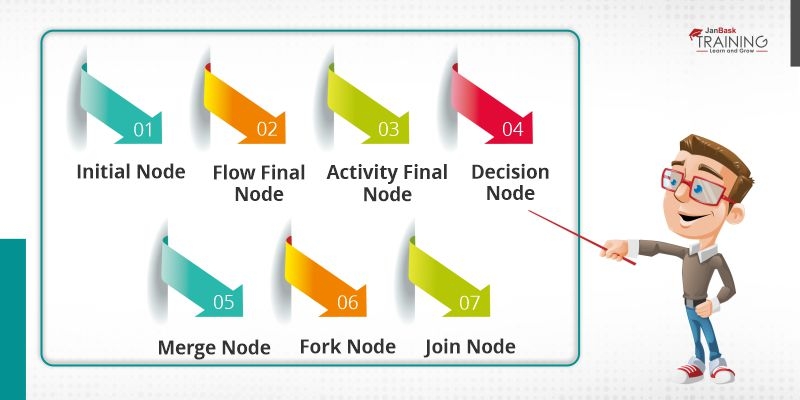
The components that form the basis of interaction overview diagram in UML are
The incident over here are references to subsisting collaboration charts. A communication event has appeared as a kind of perspective casing; that is, a casing with "ref" in the upper left corner. The name of the graph being referenced appears in the focal point of the edge.

Whereas, elemental components are like communication events, in that they show a portrayal of existing connection graphs inside a four-sided casing. They contrast in that they manifest the substance of the evidence chart inline.
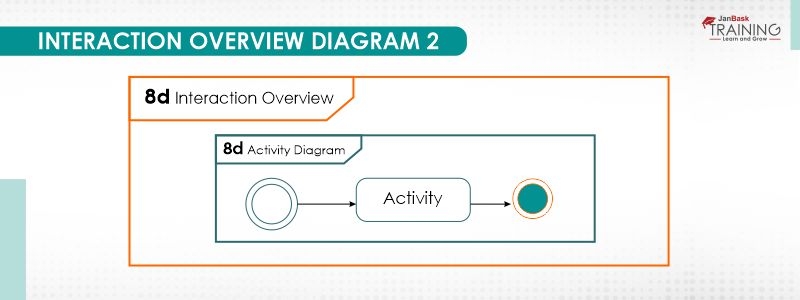
But when both these are established mutually for synergy survey diagram, they work in this way,
No different powers from movement outlines (fork, join, combine, and so forth.) can be utilized on cooperation review graphs to set the command rationale encompassing the more inexpensive level charts. The accompanying model delineates an example deal process, with subforms disconnected inside connection events.
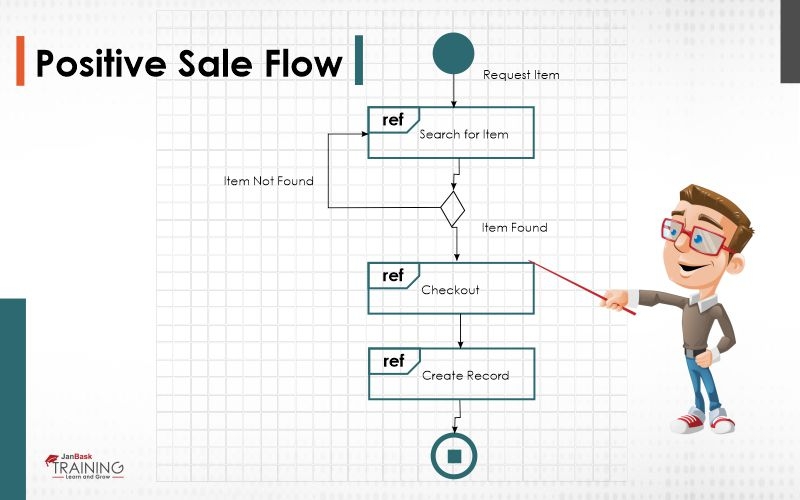
Let’s see this from the eyes of the technical team as well as from the angle of an analyst.
How does this work for developers? In what way the definition of class, objects go for them? How does the interaction overview diagram drive the use case scenario which in turn helps the testers to design their test cases?
Learn Business Analyst in the Easiest Way

Connection outlines unite many existing models and displaying components: from the utilization case model, the utilization cases, the entertainers, use case situations and portrayals; from the class graph, the articles associated with every situation, and the procedure on classes. Similarly, it permits the engineer to pick a name for the message bolt from a rundown of tasks characterized by the objective item's class.
During the investigation, we are utilizing connection outlines basically to turn out how gatherings of articles will work together in a procedure, as a rule as a utilization case situation. At this stage, we are as yet resolving the wrinkles in the designation of obligations to classes and the ramifications of this as far as a procedure on classes and informing between objects. During structure we center around the code; we utilize the collaboration outlines, basically, to give a theoretical perspective on what's going on when the program is running. To accomplish this we have to add more detail to the models: we examine how to determine the creation and cancellation of items, how to indicate restrictive conduct and rehashed conduct, how to utilize communication graphs at various degrees of detail utilizing different articles and bundles.
During the execution of a utilization case situation, the gathering of articles isn't really fixed; new items can be made, existing articles can be erased. Articles that are made or erased in collaboration are called transient items.
Having said that, let’s understand the role interaction overview diagram in UML plays for business modeling -
Business Analyst Training & Certification

Connection Overview graph showed up in adaptation 2.0 because of the need to finish the issues impediments of movement and succession charts. The idea of the Interaction Overview chart is to show the association of the parts inside the framework at a more significant level of deliberation. The more grounded side of the Interaction Overview graph is the way that it can show reliance between the significant groupings of a business framework, which can be introduced by a stream outline or by a movement chart. A solitary grouping inside the Interaction Overview graph can be a succession chart or use case outline associated with on the off chance that, at that point, else structure (which empowers disintegration to bring down degrees of deliberation). Since the Interaction Overview chart is a less complex type of movement graph, it is utilized to show typical and elective succession streams inside a business framework. These streams are acknowledged by joining stream outline components and arrangement graph references. After the Interaction Overview graph showed up in UML 2.0 adaptation, its further advancement into setting charts can be normal.
The motivation behind the interaction diagram is to envision the intelligent conduct of the framework. Imagining the connection is a troublesome errand. Subsequently, the arrangement is to utilize various kinds of models to catch the various parts of the association.
Grouping and coordinated effort graphs are utilized to catch the dynamic nature however from an alternate edge.
Some key points could be -
We have just talked about that interaction overview diagram in UML are utilized to portray the dynamic idea of a framework. Presently, we will investigate reasonable situations where these graphs are utilized. To comprehend the down to earth application, we have to comprehend the essential idea of grouping and coordinated effort chart.
The fundamental reason for both the outlines is comparative as they are utilized to catch the dynamic conduct of a framework. In any case, the particular design is progressively imperative to explain and comprehend.
Business Analyst Training & Certification

Succession graphs are utilized to catch the request for messages spilling out of one article to another. Joint effort charts are utilized to portray the auxiliary association of the items participating in the communication. A solitary outline isn't adequate to portray the dynamic part of a whole framework, so a lot of charts are utilized to catch it in general.
Cooperation outlines are utilized when we need to comprehend the message stream and the auxiliary association. Message stream implies the succession of control stream starting with one item then onto the next. Basic association implies the visual association of the components in a framework.
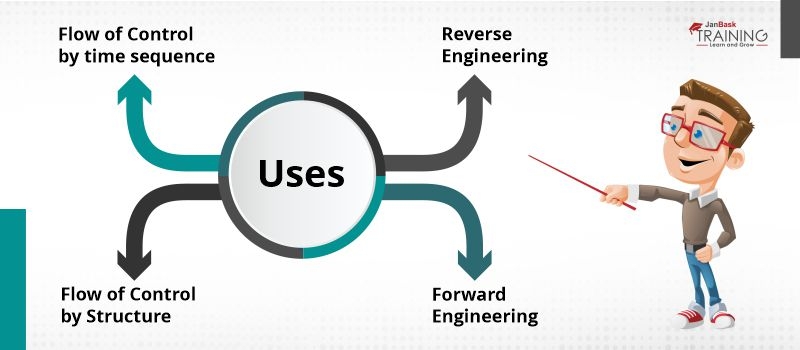
Having studied so much around interaction overview diagrams, let’s go through interaction overview diagram examples. These diagrams can be expressed easily via any tools for UML diagrams that are available online.
Interaction Overview Diagram Example - Reservation of a Room
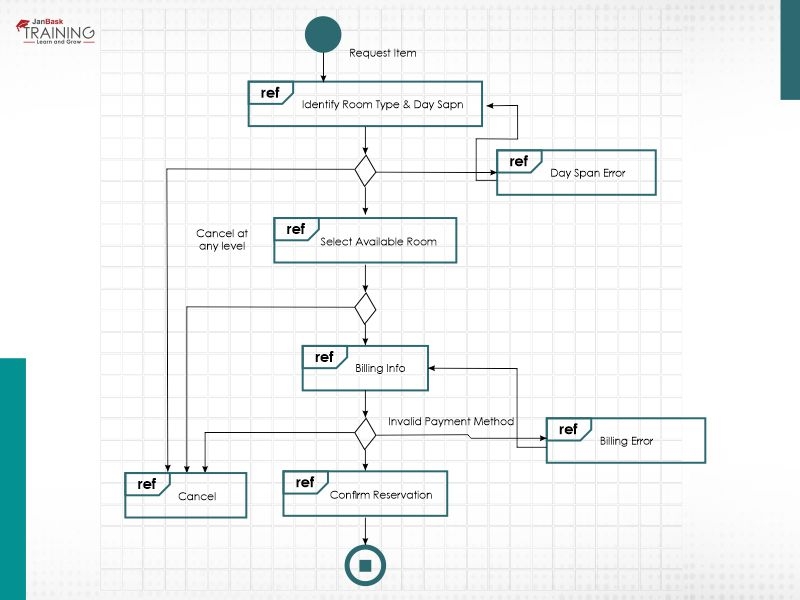
Now you might possess the idea that UML plans are extremely diverse that they can solve multiple usage cases. To simplify I would say when you combine activity and sequence diagrams, you tend to build interactive diagrams. Examine any active use cases and draw an interaction overview diagram. I have tried my level best to simplify this topic because these are not very often used. Yes at the top level of client requirement if we draw this it gives immense acceleration to the project. I believe you had a great learning experience. Happy learning Learners.
 Pinterest
Pinterest
 Email
Email
The JanBask Training Team includes certified professionals and expert writers dedicated to helping learners navigate their career journeys in QA, Cybersecurity, Salesforce, and more. Each article is carefully researched and reviewed to ensure quality and relevance.

Cyber Security

QA

Salesforce

Business Analyst

MS SQL Server

Data Science

DevOps

Hadoop

Python

Artificial Intelligence

Machine Learning

Tableau
Search Posts
Related Posts
All You Need to Know About Business Analyst Qualification
![]() 393.2k
393.2k
Importance of Ab Initio Metadata Hub in the Life of Business Analyst
![]() 10.7k
10.7k
Business Analyst Skills for Career Growth & Job Success
![]() 478k
478k
Effective Business Analysis Tools - Turn Raw Data Into Actionable Insights Fast!utes
![]() 6.2k
6.2k
What does a Business Analyst do? The Key Roles & Responsibilities
![]() 134.2k
134.2k
Receive Latest Materials and Offers on Business Analyst Course
Interviews